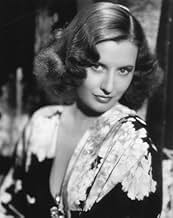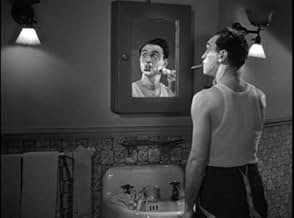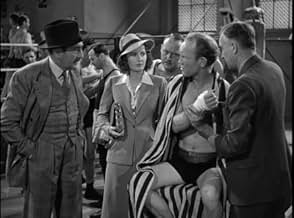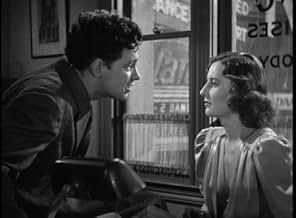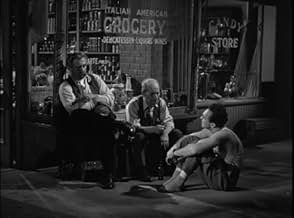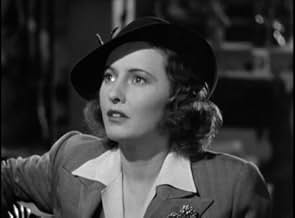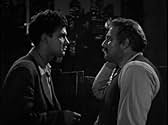VALUTAZIONE IMDb
6,8/10
2268
LA TUA VALUTAZIONE
Aggiungi una trama nella tua linguaA poor young Italian man, who is a virtuoso on the violin, wishes to become a champion boxer to make a fortune for his family. But what is the road to success and happiness, and what is the ... Leggi tuttoA poor young Italian man, who is a virtuoso on the violin, wishes to become a champion boxer to make a fortune for his family. But what is the road to success and happiness, and what is the price?A poor young Italian man, who is a virtuoso on the violin, wishes to become a champion boxer to make a fortune for his family. But what is the road to success and happiness, and what is the price?
- Candidato a 1 Oscar
- 1 vittoria e 1 candidatura in totale
Edward Brophy
- Roxy Lewis
- (as Edward S. Brophy)
Charles Halton
- Newspaperman
- (scene tagliate)
Stanley Andrews
- Driscoll - Fight Official
- (non citato nei titoli originali)
Gordon Armitage
- Fighter
- (non citato nei titoli originali)
Earl Askam
- Policeman
- (non citato nei titoli originali)
Don Brodie
- Reporter
- (non citato nei titoli originali)
Mushy Callahan
- Fight fan
- (non citato nei titoli originali)
Dora Clement
- Ill Ringsider Who Won't Leave
- (non citato nei titoli originali)
Recensione in evidenza
Clifford Odets' play about a musician turned boxer was a natural for Hollywood, which has always loved boxing movies. Perhaps subliminally, Odets was inspired by the Fannie Hurst "Humoresque," first made into a film in 1920.
When "Golden Boy" was done in 1938 as a production of the Group Theater, John Garfield hoped to play the role of Joe Bonaparte and was disappointed when the lead went instead to Luther Adler, with Garfield relegated to the role of Siggie.
Garfield rectified this in 1952 when he played the lead on Broadway and also had his chance to play a boxer in "Body and Soul" and a violinist in "Humoresque." Tony Curtis is another who did the part of Joe as a young actor before going to Hollywood.
There are two ways of casting this role - the Garfield way - the streetwise fighter who happens to be a gifted violinist, or the reverse - the gentle violinist who just happens to be a gifted fighter. The latter is more interesting, as the audience is then able to see how the fight world changes an artistic soul.
Columbia took this route and chose 27-year-old Richard Carlson for the role, but he was appearing on Broadway at the time. After testing nearly everyone, the studio put 21-year-old William Holden in the role. His was a new face and a pretty one - he certainly didn't look like a fighter.
A part like this for someone who had two uncredited film appearances had to have been like winning Scarlett O'Hara and just as daunting; were it not been for the help and intervention of Barbara Stanwyck, who played Lorna (originally done on stage by Frances Farmer) Holden would have been fired.
The theme of following your heart, so often explored by Eugene O'Neill, is another overriding theme in this story, with the character of Joe Bonaparte torn between his love for playing the violin and the appeal of making money as a fighter and being somebody.
Joe comes from an immigrant family who all live together - seen so often in films from the '30s and '40s -- again, "Humoresque" comes to mind. This immediately dates the film and puts it right into its period.
The other thing that dates it is the over the top performance of Lee J. Cobb as Joe's dad. Cobb was in the original play on Broadway but as another character; he would repeat his role as the father in the Garfield production. Undoubtedly this characterization worked better on stage and definitely worked better for a '30s audience.
William Holden gives a tender performance as Joe, an artist at heart who falls for his manager's girlfriend. Like Glenn Ford, he had one of those faces that changed so totally that he isn't even recognizable as William Holden in this film - even his voice is different.
He's young, beautiful, with an unlined face and a higher voice. His performance opened up light leading man roles for him. It wasn't until 1950 that he had his second breakthrough film, "Sunset Boulevard" - which vaulted him into superstardom. That William Holden was virile, rugged, and handsome. It's an amazing transformation.
Stanwyck is perfect as Lorna Moon - tough, sexy, and a marshmallow underneath. Her chemistry with Holden is excellent. He never forgot how much she helped him, and sent her roses each time she started a new film.
"Golden Boy" was turned into a Broadway musical as well - there's something enduring about the story of a man's struggle to find his true destiny. This is as good an example of that struggle as you'll find anywhere.
When "Golden Boy" was done in 1938 as a production of the Group Theater, John Garfield hoped to play the role of Joe Bonaparte and was disappointed when the lead went instead to Luther Adler, with Garfield relegated to the role of Siggie.
Garfield rectified this in 1952 when he played the lead on Broadway and also had his chance to play a boxer in "Body and Soul" and a violinist in "Humoresque." Tony Curtis is another who did the part of Joe as a young actor before going to Hollywood.
There are two ways of casting this role - the Garfield way - the streetwise fighter who happens to be a gifted violinist, or the reverse - the gentle violinist who just happens to be a gifted fighter. The latter is more interesting, as the audience is then able to see how the fight world changes an artistic soul.
Columbia took this route and chose 27-year-old Richard Carlson for the role, but he was appearing on Broadway at the time. After testing nearly everyone, the studio put 21-year-old William Holden in the role. His was a new face and a pretty one - he certainly didn't look like a fighter.
A part like this for someone who had two uncredited film appearances had to have been like winning Scarlett O'Hara and just as daunting; were it not been for the help and intervention of Barbara Stanwyck, who played Lorna (originally done on stage by Frances Farmer) Holden would have been fired.
The theme of following your heart, so often explored by Eugene O'Neill, is another overriding theme in this story, with the character of Joe Bonaparte torn between his love for playing the violin and the appeal of making money as a fighter and being somebody.
Joe comes from an immigrant family who all live together - seen so often in films from the '30s and '40s -- again, "Humoresque" comes to mind. This immediately dates the film and puts it right into its period.
The other thing that dates it is the over the top performance of Lee J. Cobb as Joe's dad. Cobb was in the original play on Broadway but as another character; he would repeat his role as the father in the Garfield production. Undoubtedly this characterization worked better on stage and definitely worked better for a '30s audience.
William Holden gives a tender performance as Joe, an artist at heart who falls for his manager's girlfriend. Like Glenn Ford, he had one of those faces that changed so totally that he isn't even recognizable as William Holden in this film - even his voice is different.
He's young, beautiful, with an unlined face and a higher voice. His performance opened up light leading man roles for him. It wasn't until 1950 that he had his second breakthrough film, "Sunset Boulevard" - which vaulted him into superstardom. That William Holden was virile, rugged, and handsome. It's an amazing transformation.
Stanwyck is perfect as Lorna Moon - tough, sexy, and a marshmallow underneath. Her chemistry with Holden is excellent. He never forgot how much she helped him, and sent her roses each time she started a new film.
"Golden Boy" was turned into a Broadway musical as well - there's something enduring about the story of a man's struggle to find his true destiny. This is as good an example of that struggle as you'll find anywhere.
Trama
Lo sapevi?
- QuizWilliam Holden was so grateful to Barbara Stanwyck for her insistence on casting him in Passione (1939), his first big role, that he reportedly sent her flowers every year on the anniversary of the first day of filming.
- BlooperJoe's chest is completely smooth during the big fight. Immediately after the fight, when he is dressed, he has chest hair visible at the top of his shirt.
- Citazioni
Eddie Fuseli: This your girl?
Lorna Moon: I'm my mother's girl.
- Versioni alternativeA video version in Argentina was lifted from a 16mm print from Columbia Pictures, in English with Spanish language subtitles. The credits of this version are translated in Spanish.
- ConnessioniEdited into Sogni perduti (1968)
- Colonne sonoreWe're in the Money Now
Sung a cappella by Adolphe Menjou to the tune of the traditional
nursery rhyme "The Farmer in the Dell"
I più visti
Accedi per valutare e creare un elenco di titoli salvati per ottenere consigli personalizzati
- How long is Golden Boy?Powered by Alexa
Dettagli
- Data di uscita
- Paese di origine
- Lingua
- Celebre anche come
- Il ragazzo d'oro
- Luoghi delle riprese
- Eighth Avenue and 50th Street, Manhattan, New York, New York, Stati Uniti(Madison Square Garden, located at the West side of 8th Avenue from 1925 to 1968)
- Azienda produttrice
- Vedi altri crediti dell’azienda su IMDbPro
- Tempo di esecuzione1 ora 39 minuti
- Colore
- Proporzioni
- 1.37 : 1
Contribuisci a questa pagina
Suggerisci una modifica o aggiungi i contenuti mancanti

















